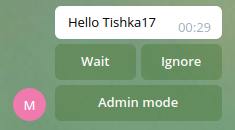Hiding widgets#
Actually every widget can be hidden including texts, buttons, groups and so on.
It is managed by when attribute. It can be either a data key, a predicate function or a F-filter (from magic-filter).
F-filter receives the data from the getter and other dialog data. You can refer to it, for example F["extended"] or F["dialog_data"]["user"]["name"]
from typing import Dict
from aiogram.filters.state import StatesGroup, State
from magic_filter import F
from aiogram_dialog import Window, DialogManager
from aiogram_dialog.widgets.common import Whenable
from aiogram_dialog.widgets.kbd import Button, Row, Group
from aiogram_dialog.widgets.text import Const, Format, Multi
class MySG(StatesGroup):
main = State()
async def get_data(**kwargs):
return {
"name": "Tishka17",
"extended": False,
}
def is_tishka17(data: Dict, widget: Whenable, manager: DialogManager):
return data.get("name") == "Tishka17"
window = Window(
Multi(
Const("Hello"),
Format("{name}", when="extended"),
sep=" "
),
Group(
Row(
Button(Const("Wait"), id="wait"),
Button(Const("Ignore"), id="ignore"),
when=F["extended"],
),
Button(Const("Admin mode"), id="nothing", when=is_tishka17),
),
state=MySG.main,
getter=get_data,
)

If you only change data setting "extended": True the window will look differently

- class aiogram_dialog.widgets.common.when.Predicate(*args, **kwargs)#
- abstract __call__(data, widget, dialog_manager)#
Check if widget should be shown.
- Parameters:
data (Dict) – Data received from getter
widget (Whenable) – Widget we are working with
dialog_manager (DialogManager) – Dialog manager to access current context
- Returns:
Trueif widget has to be shown,Falseotherwise- Return type:
bool